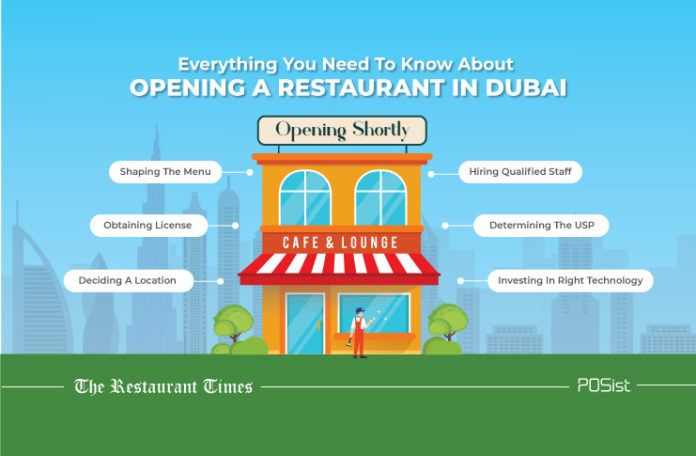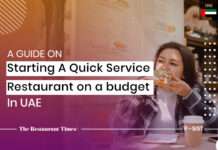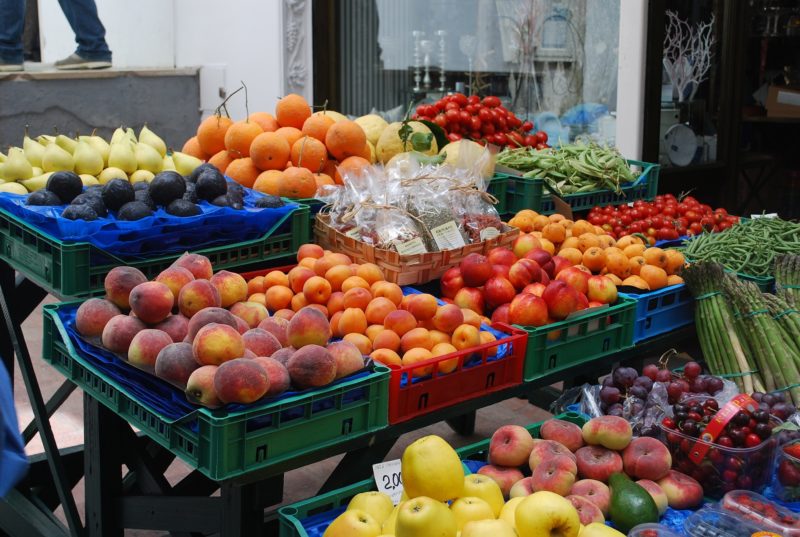Dubai, the city where approximately 4.7 million tourists visit each year, provides an excellent opportunity for starting a restaurant business. Dubai is fast emerging as one of the top global food destinations and opening a restaurant in Dubai can prove to be extremely lucrative, if done correctly.
Like any other city, there are specific business requirements you need to fulfill before opening a restaurant business in Dubai. This article will guide you through the entire process of starting a restaurant in the Persian Gulf Coast of UAE.
How To Open A Restaurant In Dubai
Dubai has a strict food code that every eatery, be it a fine dining restaurant, cafe, or bakery have to abide by. This food code is designed to assist the person in charge of running the restaurant to operate as per the requirements.
There are several things you can take into consideration when planning to open a restaurant and we have prepared a comprehensive list of those things. This list will help you open the restaurant of your dreams in the luxurious city of Dubai.
1. Costs To Consider Before Opening A Restaurant
Opening a restaurant business requires a hefty investment; therefore before you start a restaurant, you should jot down those expenses to avoid wasting money on unnecessary things or going overboard and spending more than what’s required.
For every restaurant owner, it is essential to have an approximate idea of the expenses they will have to bear beforehand. Some of the costs to consider before opening a restaurant are:
- License
- Rent or expense of buying a new property
- Permissions
- Staff training programme
- Software for daily operations
- Insurance
- Working capital
- Cost of setting up the restaurant – equipment, tables, chairs, etc.
These are some of the initial investment you’ll have to take care of while opening a restaurant.
2. Obtaining A license For Opening A Restaurant In Dubai
Even before you decide to book a slot in your favorite location, you need to obtain all the necessary permits that would allow you to open a restaurant.
In Dubai, you are required to procure mainly two types of licenses in order to open a restaurant.
- Trade license
- Food license
(i) Trade License
Dubai’s Department of Tourism and Commerce Marketing is responsible for providing the Trade License. You are required to mention the kind of restaurant you’d be operating, as it needs to be clearly mentioned in the license.
Trade License could cost you AED30,000 to AED40,000, depending upon several factors like the type of restaurant you own and operate.
Steps for procuring the Trade License for opening a restaurant in Dubai are:
- Determine the nature of the enterprise – commercial, professional, or industrial
- Identify the corporate activities that the company is engaged in (maximum of 10 activities per license)
- Designate a legal status for your enterprise in the UAE
- Select and register a trade name for your company
- Submit an application for initial approval
- Lease a corporate office
- Prepare all the pertinent documents
- Submit a further application to the DED for the final approval
(ii) Food License
The Food Safety Department is responsible for providing the Food License in Dubai. After you have your Trade License, you need to procure this license in order to receive approval for the construction plan of your restaurant.
The following documents must be produced before the food safety department to obtain the Food License.
(i) Copy of the trade license or primary approval from authority that issues trade license
(ii) Interior design layout of the premises, if applicable. This is essentially a blueprint of your restaurant. This restaurant blueprint must contain the following –
- The entry and exit passages
- Space for processing food
- Area for storing food
- The windows and ventilation system
- Location of food equipment that will be used to prepare the food
- Dishwashers, and other supportive equipment
Apart from these, the restaurant is also required to obtain the following licenses:
- Food consignment release license
- Pork permit for handling and serving pork products
- Vehicle permit for transporting food products
- Liquor License (if you are planning to serve liquor at your restaurant)
3. Determining Your Restaurant’s Concept And USP
When opening a restaurant, you need to have a unique concept in your mind, something that would help you stand out from your competitors. This will give you an upper-hand in Dubai’s competitive restaurant industry.
Your restaurant concept includes the service style of your restaurant, the food you serve, and the ambiance of your restaurant.
Another thing you need to consider is determining your restaurant’s USP. If you have an unusual theme or introduce an innovative menu item, it will help attract a lot of customers. Therefore, experiment with what has never been done before!
4. Deciding A Location
Dubai is home to over two hundred nationalities, which widens the scope for the restaurant owners and lets them cater to different audiences depending on the type of restaurant they run. Before you freeze a location make sure to do some research on that place and its demographics also see whether that place has enough footfall to sustain your restaurant business.
Your restaurant’s location plays a very vital role in determining whether your restaurant would be a hit or a miss amongst the Emiratis and the tourists.
Factors to consider while deciding the location:
- Visibility– Setting up your restaurant in a visible location is very vital. Ensure the footfall is high and your restaurant sign is visible.
- Accessibility– It makes a huge difference if your restaurant is situated in an accessible area. If people can reach your restaurant easily, they are more likely to revisit your restaurant due to the easy accessibility factor.
- Customer Base– It is essential to identify your target audience and then you can go about deciding the location apt for the desired audience base.
- Affordability– If the rent is high, you might find it difficult to make profits on certain food items. Do your research see if there are chances of the lease skyrocketing based on the previous pattern.
- Proximity To Suppliers– The shipping costs can sometimes be more than the original amount of the raw materials. You need to figure out from where you will be getting all the raw materials required for cooking and how far away is your restaurant from the supplier.
Some of the best locations to open your restaurant in Dubai are:
- Jumeirah
- Emirates Hills
- Dubai Creek
- Mall of the Emirates
- Al Quoz
You can select a location based on the type of restaurant you wish to open. For example, if you plan to open a fine dining restaurant, Jumeirah Beach Road would be an excellent location for you since it is an affluent locality.
5. Creating The Menu
Before you open your restaurant’s door, you need to curate the menu and decide what all it would feature. You also need to engineer your menu the right way and select and price the menu items correctly so as to cover your Prime Cost, which includes the Cost of Goods Sold and the Labor Costs.
You also need to craft your menu carefully so that your customers would be inclined to order the high-profit items. You can do this by placing the high-profit items at the places which draw the most attention and by writing tempting menu descriptions.
Initially, your menu need not to be completely designed nor do your recipes need to be completely fleshed out. You can gradually keep updating the menu as you gain information about which food items sell well and which do not.
6. Designing The Restaurant Layout
Creating a restaurant layout can be a little overwhelming but is a much-required step when starting a starting a restaurant, how your restaurant is laid out has a significant impact on its day-to-day operations. It will support the daily operations of your restaurant, by providing an ample amount of space to move around freely and well as helps in leaving a good impression on your guests as all the operations are performed swiftly.
You’ll want to put careful thought into how you can organize your entire layout to meet the goals outlined in your menu and theme.
Tactfully utilize the space available and place all the elements wisely. It is essential to analyze and put everything from the tables to the kitchen equipment correctly to assure maximum utilization of the area without hindering the daily operations.
Once your basic layout is established, you can design and decorate your dining room.
7. Investing In The Right Technology
In today’s tech-savvy world you cannot overlook the importance of technology. When starting a restaurant, it is vital to invest in an efficient POS system that will help ease the work for you in the long run.
As a restaurant owner, you are expected to be present everywhere, supervising various departments but, it is physically challenging and nearly an impossible task. Using technology becomes very important if you wish to keep an eye on the daily operations.
A POS system would enable you to perform various day-to-day tasks like the ones mentioned below.
- Billing: A good POS system can perform billing operations smoothly. Billing is one of the most critical activities in any restaurant; therefore you can entirely rely on a POS system to eliminate any errors. It can also help you analyze the customer’s preferred mode of payment and develop offers regarding the same.
- Pushing Orders: POS systems let you push the orders directly to the kitchen which eliminates any delays and misunderstandings.
- Stock & Inventory Management: Manage your inventory levels efficiently using a POS. You can check how much raw material is required or how much is available at present. Managing the inventory properly will help you manage your capital wisely and prevent any loss, which is very crucial for anyone just starting off in the restaurant industry.
- Get Accurate Reports: You can get real-time reports and analyze them on the go using a POS system which would eliminate the need of being present everywhere.
- Marketing: Not just managing the restaurant activities a POS system also enables you to reach out to your customers and help market your restaurant to them by sending out emails, SMS, etc. You can also run loyalty programs using a POS system.
All these features will help you manage the day-to-day activities at your restaurant seamlessly, which is much required to make your mark in Dubai’s food and beverage industry.
8. Hiring Qualified Staff
Having good employees is a clear indication of a good restaurant and the best service; therefore it is essential to hire the best staff. The restaurant industry in the Gulf region has a high turnover rate which makes it very important to hire people who would stay and help your restaurant business grow.
Before you start hiring you need to consider various roles you wish to hire people for.
- Sous chef
- Prep cooks
- Manager
- Servers
- Bartenders (if you wish to serve alcohol)
- Host
- Cleaning staff
These are some of the basic common staff requirements for all the restaurants that you would have to fill before you open your restaurant’s door. You can start with the minimum number of employees and gradually hire more as and when the need arises.
Opening a restaurant at first can seem like a tedious task, but it is rewarding if done correctly. Dubai provides an excellent platform for budding entrepreneurs and offers great opportunities. The restaurant industry in the Gulf continues to grow, and foodservice trends continue to diversify, there is always room for another fantastic eatery.
















